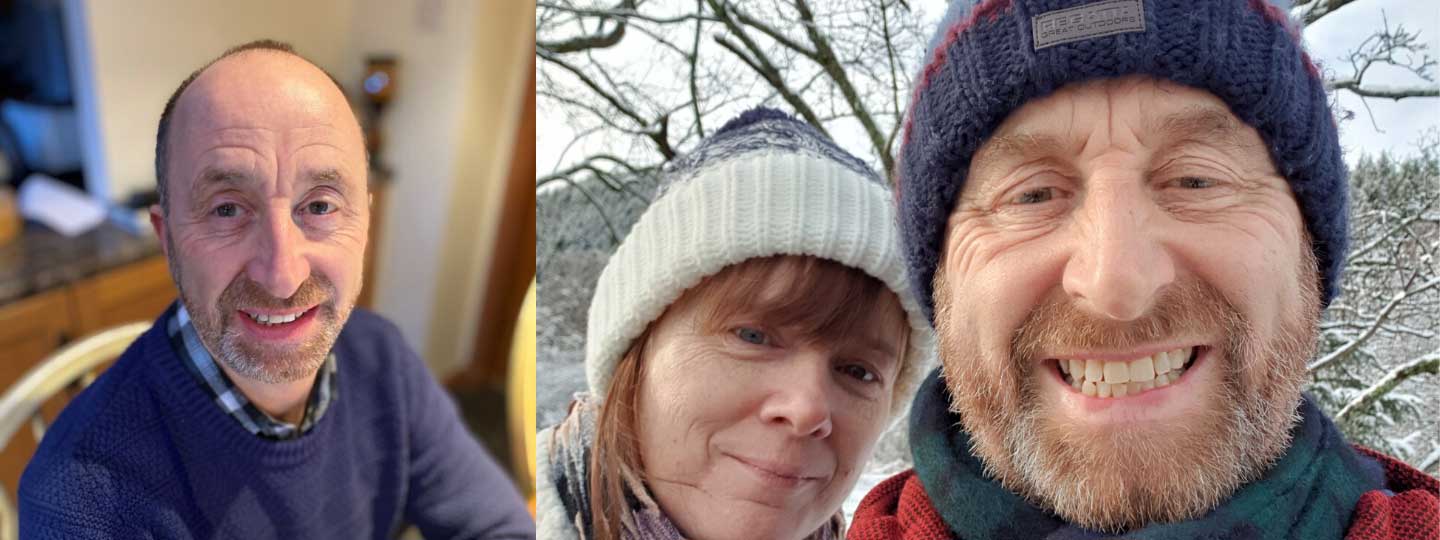“Pain isn't something that people can see and comprehend”
18 February 2020
Ken Brown is 61 and married to Cathy. He's retired from full-time nursing but occasionally works as an NHS nurse on an ad hoc basis.
He shares his thoughts and experiences of living with the long-term pain of arthritis.
A childhood trauma
I was knocked over by a drunk driver when I was ten which left me with a fractured pelvis and a painful right hip.
I found it difficult growing up, it was hard to get over the trauma, not just physically but psychologically too, and it knocked my self-confidence a great deal. This led to me to being diagnosed with osteoarthritis in my forties.
Nursing with the pain of arthritis
I worked as a nurse for over 30 years in complex care and rehabilitation and experienced the lack of support available to people with arthritis who are often living alone with chronic pain.
The treatment is often just prescribing painkillers, even though there are many alternatives that people aren’t aware of.
There’s an attitude that it’s “just a bit a pain”. Well it isn’t! The overwhelming fatigue drains the energy out of you, leaving you deflated.
The uncertainty of the pain stops you in your tracks, preventing you from working or participating in social events.
My job as a nurse meant a lot of lifting which wasn’t great for my arthritis so I occasionally had to move into teaching nursing.
I got little sympathy when I started to complain about the lack of support for my arthritis. Nurses are hard hit by musculoskeletal conditions and pain. We were eventually offered some Tai Chi exercise classes which helped.
How I’ve learnt to manage pain
My experience of the pain from arthritis is the feeling you get the day after a very intense workout at the gym.
The fatigue is so hard to describe, but the worst feeling of all is the grinding bone pain as if someone has drained the energy out of you.
The realisation that you can’t do what you used to is hard to come to terms with – it’s difficult to even go out to the shops sometimes.
Arthritis has undoubtedly been a battle over the years, both personally and professionally. Losing out on opportunities and relationships.
Learning to control the pain through mindfulness
Over the years I’ve found different ways to combat the pain as I don’t like to take anything stronger than co-codamol.
I attended a pain clinic for 12 weeks which involved advice and support from physiotherapists, pharmacists and clinical psychologists. It was about learning to live with pain and limiting its impact.
I left realising the benefits of ‘mindfulness’ – finding techniques to breathe through the pain, learning to accept it and how to deal with it. I came to realise that you are in control of the pain, it’s not in control of you.
I use a combination of methods to help manage my pain. I use mindfulness, stretching exercises, walking, arthritis gloves, a TENS machine, analgesic gels as well as pain killers. I try to go walking and cycling as much as possible and having a mainly positive attitude has helped me get through.
The complexities of pain
The language of pain is complex and it’s challenging because it’s relative – people have varying levels of pain thresholds. We all deal with pain in our own way.
Pain is not something that people can see and is therefore often difficult for others to comprehend. It is a hidden disability.
Arthritis can affect anyone at any age
I hope that someday arthritis is viewed as not just an old person’s disease, that it can affect anyone at any age.
Pain is like a journey on a very bumpy road which trips you up at every opportunity. But there’s a reason for it! People with arthritis strive to live normal everyday lives despite the fact we live in a world not willing to adjust, assist or tolerate.
We need to work harder and shout louder to help us move along life’s road more easily which is why I continue to campaign on behalf of Versus Arthritis.
It’s only when people raise their voices together in a common cause, that the combined noise gets noticed. Only then can action occur for the good of many.
Get the support you need
If you want help, support or information, call our helpline on 0800 5200 520 (Monday to Friday, 9am to 6pm) or join our online community.
We’re here whenever you need us.
- If you would like to talk to someone, you can call our free helpline on 0800 5200 520
- Chat to our Arthritis Virtual Assistant
- Join our online community
- Stay in touch and follow us on Twitter, Facebook and Instagram.